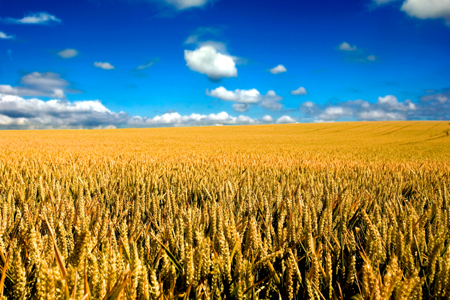Tests of Exported U.S. Wheat Find No Sign of Altered Strain
Category: Food Safety, Grains, Miscellaneous
 (Businessweek) – Tests of U.S. wheat imported by Japan, South Korea and the European Union have found no evidence of the unapproved gene-altered strain discovered in Oregon in April, Agriculture Secretary Tom Vilsack said.
(Businessweek) – Tests of U.S. wheat imported by Japan, South Korea and the European Union have found no evidence of the unapproved gene-altered strain discovered in Oregon in April, Agriculture Secretary Tom Vilsack said.
A field owned by an Oregon farmer who reported the wheat, which was a type developed by Monsanto Co. (MON) and not approved for sale or human consumption, also shows no evidence of further contamination, and interviews with farmers turned up no sign the strain spread, Vilsack said today in an interview at the U.S. Department of Agriculture. How the rogue wheat got into the field remains unknown, he said.
“To date there is nothing to suggest this is in the stream of commerce,” he said. “We’ll continue the investigation.”
The discovery of the altered wheat in Oregon, nine years after St. Louis-based Monsanto ended an effort to have the wheat approved for commercial sale, prompted Japan to halt imports of western-white and feed wheat. South Korean millers have suspended purchases of U.S. white wheat, and the Taiwan Flour Mills Association said it wants the U.S. to label cargoes by state of origin. The European Union, which competes with the U.S. for exports, said it’s asked Monsanto for a method to detect genetically modified wheat.
15 Investigators
The USDA has assigned 15 investigators to learn the origin of the altered wheat and develop a faster, less expensive test for contamination, Vilsack said. Should the investigation show violations of the Plant Protection Act, which lets USDA shield crops from unapproved genetically modified plants, may lead to civil penalties as high as $1 million.
Monsanto said in a posting on its corporate blog today that it gave the USDA and U.S. trading partners a testing method to distinguish the wheat trait developed to resist the company’s Roundup herbicide from varieties approved for planting and consumption.
“Our support is aimed at ensuring that the U.S. wheat industry and wheat farmers do not experience disruptions in exports,” Philip Miller, the vice president of regulatory affairs, said in a statement. The company continues to believe the Oregon case is an isolated incident, according to the post.
Prices of U.S. wheat may decline should more nations delay or cancel purchases from the world’s largest supplier, said Abdolreza Abbassian, senior economist at the Food & Agriculture Organization, in an interview. “If more countries start having second thoughts or cancel their purchases, it could have downward pressure on prices of U.S. wheat,” Abbassian said.
Farmer Lawsuit
Ernest Barnes, a Kansas wheat farmer, yesterday sued Monsanto in federal court in Wichita seeking at least $100,000 in damages for lower wheat prices triggered by the export limits. Monsanto tested genetically modified wheat “knowing full well that release of its experimental seeds into the general wheat population could result in the loss of huge domestic and export markets,” according to a copy of the complaint provided by the farmer’s lawyer.
The U.S. Food and Drug Administration determined in a 2004 consultation that the crop is as safe for people and animals as is conventional wheat, the Department of Agriculture said in a statement last week.
Wheat futures, which fell the most since February after the USDA disclosed the Oregon contamination, rose 1 cent to $7.03975 a bushel at 11:47 a.m. on the Chicago Board of Trade. Prices through yesterday tumbled 26 percent from an almost four-year high of $9.4725 on July 23, as rising global supplies create a glut.




